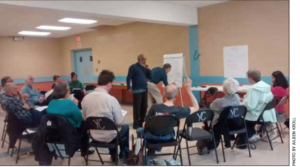
Edwin John facilitates while John Buck transcribes participant ideas during a session at the Greenbelt Youth Center on April 23.
Beginning in 2014, the Center for Dynamic Community Governance (CDCG) has endeavored to bring their organizational philosophy of Dynamic Community Governance (DCG) to the groups and residents of Greenbelt. Conceived in the 1970s in the Netherlands by Gerard Endenburg, DCG, says co-director and president of CDCG Aileen Kroll, “focuses on transparent communication, equivalence amongst participants and consent-based (vs. consensus-based) decision making.” Through this approach, “meetings are energized, different perspectives are valued, the decision-making process is streamlined and participation is increased because people feel heard and valued…there is an opportunity for conficting points of view to both be true and to be included in the fnal decisions,” said Endenburg.
DCG was introduced to Greenbelt in 2013 via a speaker on the subject, hosted by the Chesapeake Education, Arts and Research Society (CHEARS). In the audience was Kroll, already a member of CHEARS and several Greenbelt groups such as Greenbelt Time Bank; she described the experience as “a light-bulb moment.” Kroll says that “she could see this process as not only invigorating and inspiring groups from within, but also as a modality that could create interlinked circles throughout Greenbelt.” This led Kroll to seek out John Buck, now co-director of CDCG, a leading expert on DCG. After being trained by Buck, both decided to form CDCG in 2014. By 2015, CDCG had achieved non-proft status.
Training in DCG develops equivalency among participants, consent decision-making and the “circle concept,” says Kroll, “in which people are welcomed and participation is encouraged.” Consent-driven decisions result in a “fnal decision … that everyone can accept and avoids the endless deliberations that can occur with consensus, where people are asked to agree, or bitterness that can occur with a winners-losers majority vote. “Every aspect of the election process is rendered ‘transparent,’ with ‘no back-door politicking.’” Training prepares the participants to train others in the basic DCG processes. Dynamic Governance Comes To Greenbelt Organizations by Matthew Arbach.
Buck was introduced to CDCG in 1985, while on a professional trip to the Netherlands. At this early time, DCG was dubbed “sociocracy” or “rule by the socios: people with a social relationship, partners,” says Buck. Buck is the author of We the People: Consenting to a Deeper Democracy as well as an upcoming work with Jutta Eckstein that seeks to “create a synthesis of the several streams that have developed in the past 30 years to improve the management of our organizations,” says Buck.
In 2016, CDCG trained some of the board members of Greenbriar, who were in search of a way “to conduct meetings that would encourage diverse thinking and resolve conficts,” says Kroll Consulting support was given to the board members of Greenbriar “which helped them reach a resolution on a contentious matter,” she said. This led CDCG to seek a grant from the City of Greenbelt to “help Greenbriar PHOTO BY AILEEN KROLL Edwin John facilitates while John Buck transcribes participant ideas during a session at the Greenbelt Youth Center on April 23. residents address obstacles that are impacting their use of Greenbelt services offered by CARES and GAIL programs,” says Kroll. This grant is under review, with a decision pending soon.
In addition, CDCG trained representatives from many Greenbelt organizations including the New Deal Café, Old Greenbelt Theatre, Greenbelt Time Bank, Greenbelt Public Works as well as many environmental efforts.
Among some of the future plans for CDCG are continued trainings and the spreading of the DCG message to all ages and groups
CDCG will have a table at the upcoming Green Man Festival on May 13 and 14, where they plan to “have fun, educational, engaging and interactive activities for all ages,” says Kroll. For more information, refer to dynamicgovernance.org and dynamicgovernance.org/library for their online library.
